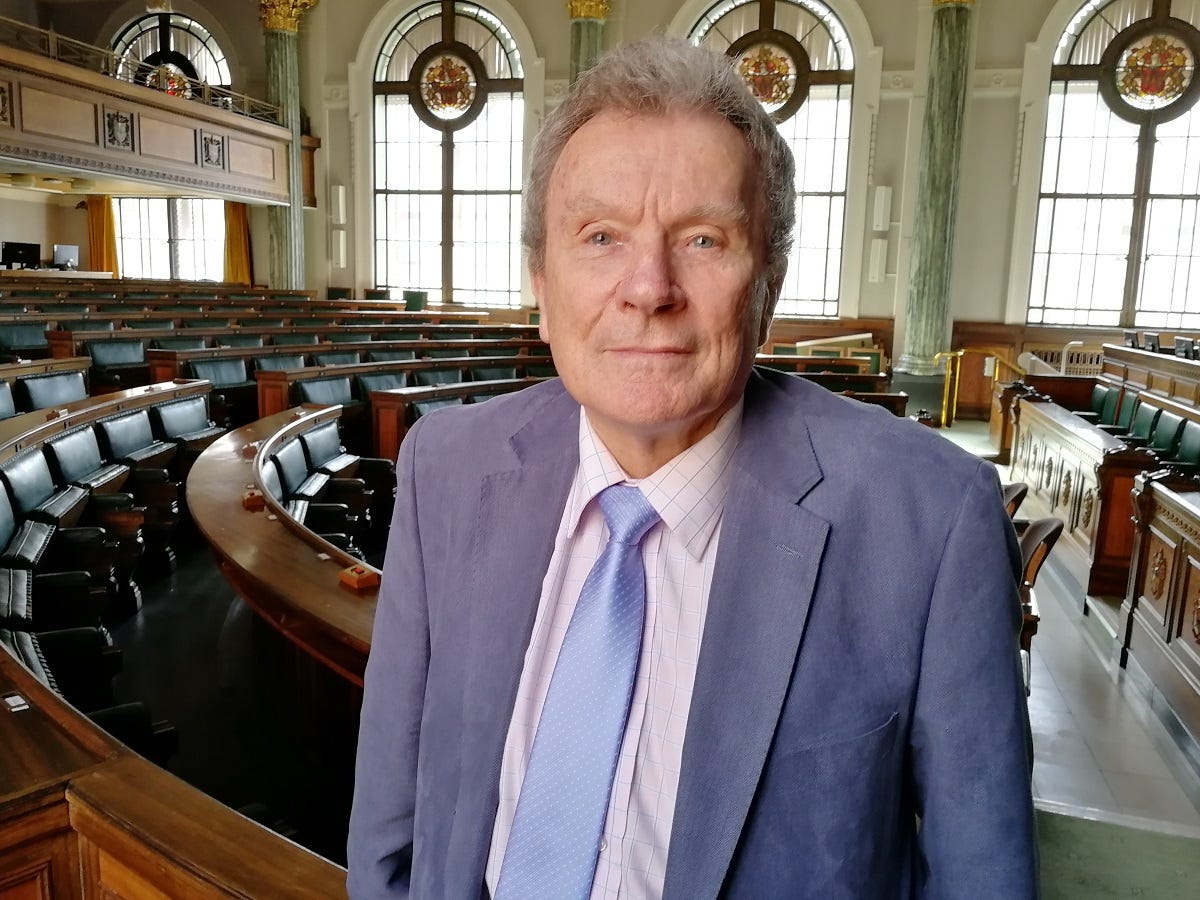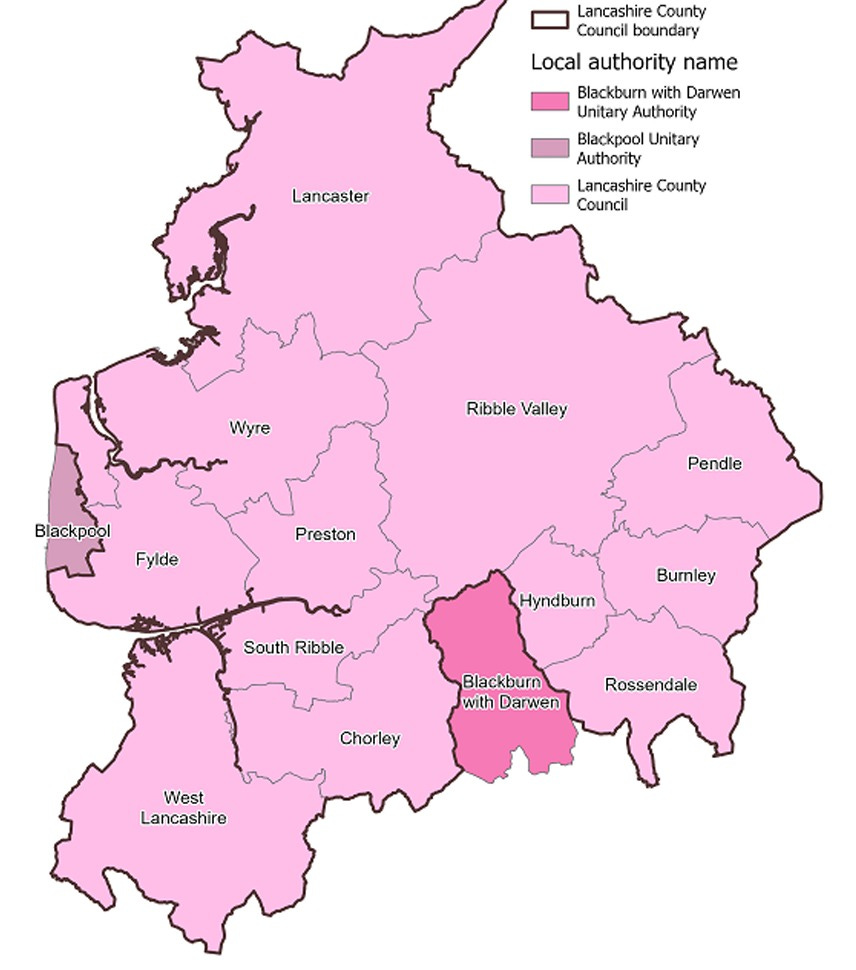14 years and over £1m to bring Geoff Driver to trial
PLUS: The latest on local government reorganisations, costs, apathy and more
Fourteen years after Operation Sheridan began, and after millions in public money being spent, former Lancashire County Council leader Geoff Driver will finally stand trial.
If any wrongdoing is proved, and if it reflects on Lancashire County Council in any meaningful way, then someone will take comfort in the fact Lancashire County Council will very likely no longer exist.
The edition focuses on what comes next for Operation Sheridan. It also looks at what comes next for plans to reorganise government in Lancashire - a super important topic that nobody seems to care very much about. We’ve looked at why that might be.
Former Lancashire County Council chief won't stand trial until 2027
By Jamie Lopez
The trial of former Lancashire County Council leader Geoff Driver will not take place until 2027.
Driver, 80, is one of four men accused in relation to Lancashire Police’s Operation Sheridan investigation into alleged financial irregularity at the local authority.
An investigation into alleged wrongdoing first began in 2013 and will have been running for some 14 years when the trial finally begins.
Driver, of Hoylake Close, Preston, was arrested in 2017 alongside former council chief executives Ged Fitzgerald and Phil Halsall and former One Connect chief executive David McElhinney
Five years later, McElhinney, 64, of Ormskirk Road, Knowsley, and Halsall, 66, of Hesketh Road, Southport; were charged with misconduct in public office and procuring misconduct in public office.
Fitzgerald, 63, of Dover Road, Birkdale, was accused of misconduct in public office and aiding and abetting misconduct in public office and Driver, of Hoylake Close, Preston, was charged with taking revenge under the Criminal Justice and Public Order Act.
Despite a first court appearance being arranged for that year, progress has remained slow.
A case management hearing is scheduled for three days in June this year ahead of a five-week trial which is due to start on April 5, 2027.
After the four men were charged, Andrew Penhale, chief crown prosecutor, said: “The CPS has reviewed a file of evidence from Lancashire Police and authorised the investigation team to issue charges against four people with offences related to the misconduct of senior local government officers in Liverpool City Council and Lancashire County Council.”
The CPS declined to comment on the delay when asked by The Lancashire Lead.
The length of time to bring charges, and complexity of Operation Sheridan, means that the CPS spent over £1m on legal advice running from 2016/17 to 2021/22.
That information was provided in a document, seen by The Lancashire Lead, that broke down the legal costs associated with Operation Sheridan year-on-year.
With a trial not beginning until 2027, it is increasingly likely that Lancashire County Council - where financial irregularity was alleged - will not exist by the time anybody sits down in court.
The investigation was believed to have cost Lancashire Constabulary up to £5m as of 2022, a number that will only have increased since.
We’re delighted to say Cosy Homes in Lancashire is supporting independent, in-depth journalism in Lancashire by sponsoring The Lancashire Lead. Discover how they can help you improve energy efficiency in your home and keep it warmer.
News in headlines 🗞️
Jamie Cooper to appear in court after four days on the run from M55 prison van escape (Blog Preston)
Paedophile Greg Riley 'lured girls' and raped one victim (Lancashire Telegraph)
Police smash criminal gang who smuggled drugs into Lancaster and Preston prisons (Lancaster Guardian)
Nigel Haworth speaks of 'pride' after son and daughter achieve culinary dream (LancsLive)
Devolution and reorganisation apathy must be overcome
By Luke Beardsworth & Ed Walker
Redrawing Lancashire’s political map under the government’s plans for local reorganisation is so fraught in part because it doesn’t make sense to do so.
Senior politicians in Lancashire have until November 2025 to submit to the government how they believe councils in Lancashire should look.
The conversations have been challenging so far - with many councils specifically not wanting to pair with others and the more affluent areas like Fylde and the Ribble Valley not wishing to pair with anyone at all.
A letter sent to the government last week was supposed to provide an interim plan for what happens if all 15 Lancashire councils are abolished and a new format takes its place - but was ultimately devoid of any specifics.
Part of the issue is that the conversation is being left to leaders of local councils - who have been famously slow to agree on very much at all - with a void where public opinion or appetite should be.
Dr David Stewart, senior lecturer in psychology and humanities at the University of Central Lancashire, told The Lancashire Lead: "One of the major differences though is how Devolution has been reached, in the devolved nations there were referendums - with clear mandates and arguments. And it gave a point for the politicians and everyone else to refer back to. In England, that hasn't happened, who asked for a Mayor? Who asked for Devolution? Your average person would be quite right in questioning why is this even happening to me and us.
"With Lancashire there isn't that over-riding passion for Devolution. It's a big problem for the politicians to overcome. Why should anyone care about it?
A lack of overarching identity or centre to the county - at least in the same way you can see clearly in Liverpool and Manchester - also means that whichever plans are put forward are easy to pick holes in.
Dr Jack Southern, lecturer in public history at the University of Central Lancashire, told The Lancashire Lead: “Lancashire has always been a patchwork of multiple different places, operating throughout the 1900s and before as a mix of town councils, rural districts and more. There's a long precedent of the county being governed and operating in this way.
"The county is a place that on the whole looks after its own affairs. It's a place that the government really struggles to understand, because it doesn't have that major city centre in the way that Manchester, Sheffield, Leeds, Newcastle or other places in the North have. It's a collection of fairly equal-size towns - although some have obtained the city status. From their culture, to economies, to populations and more there isn't much between them all.
"This is the key to the Devolution challenge, there isn't a central place to hang the Lancashire narrative on. Preston is an administrative centre, but ask anyone in East Lancashire if they are happy with being ruled from Preston and they'll give you a very strong response.”
Dr Stewart added: "This is a very Manchester-style Devolution that is being attempted to be mapped onto Lancashire - look at who is pushing it, Rayner, McMahon.
“There's an idea you can take that city-region idea and plonk it elsewhere, but your Lancashires, your Cumbrias, it is far more difficult.”
That’s Jim McMahon, Labour’s local government and devolution minister, who believes one of the key arguments for reorganising councils in Lancashire was to save on costs.
But a report presented to Lancashire County Council, whose view on being abolished could be described as reluctant, showed that replacing the current system with anything more than three unitary councils would end up costing more.
The Ministry of Housing, Communities and Local Government did not respond to a request for comment on the possible cost implications of reorganisation in Lancashire.
Apathy to local government reorganisation and devolution is dangerous because it allows change to happen without the public being properly engaged.
But the complexity of politics in Lancashire is part of the problem in itself. It is not unusual for lower tier authorities like Preston City Council to be blamed for the state of the roads - despite this being managed by Lancashire County Council.
And it is not unusual for someone to live in South Ribble Borough Council’s boundaries and vote instead for an MP in the Ribble Valley - which has its council homed in Clitheroe. Clitheroe, by the way, also does not vote for an MP in the Ribble Valley.
There is a belief that getting this right is important because a failure to do so - and a failure to engage people in the process - leaves the door open to Reform UK-style politics.
Dr Stewart said: "There is a lot at stake here. Because this is already a subject that just isn't in the public's mind. As it stands then dissatisfaction with the status quo and people feeling disenfranchised is growing.
"Get Devolution and local government wrong, in Lancashire, and you play into that narrative and disillusionment further. A lot of the places across Lancashire, particularly the smaller towns - Kirkham, Nelson etc, they feel like they are left behind.
"It's no surprise the likes of Farage keep popping up there. That populist narrative, particularly on the right, feeds into this idea that 'they' i.e. the government, the council, don't know what to do.”
Thank you for reading The Lancashire Lead.
We will speak to you again on Sunday - we hope you enjoy the rest of your week.









